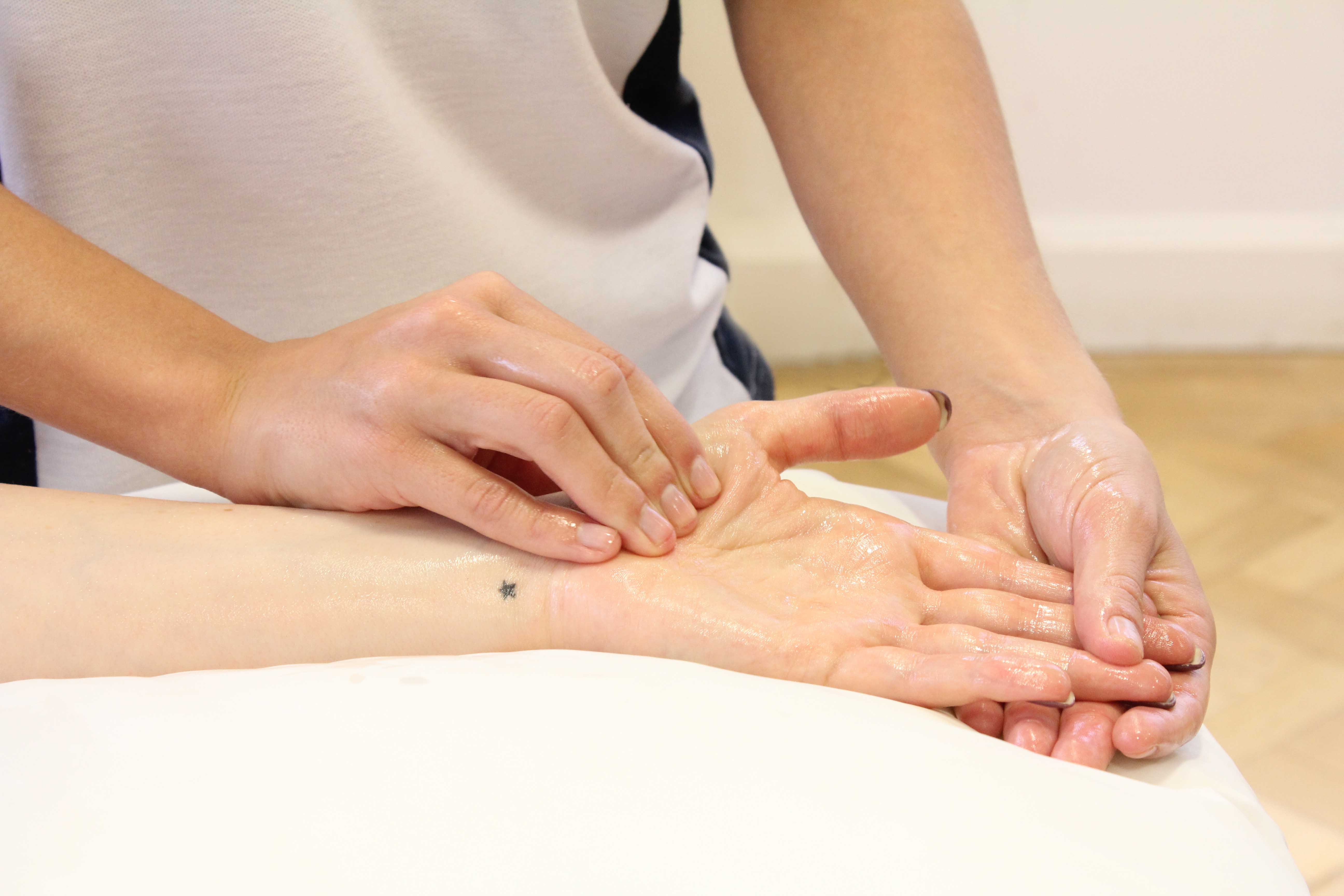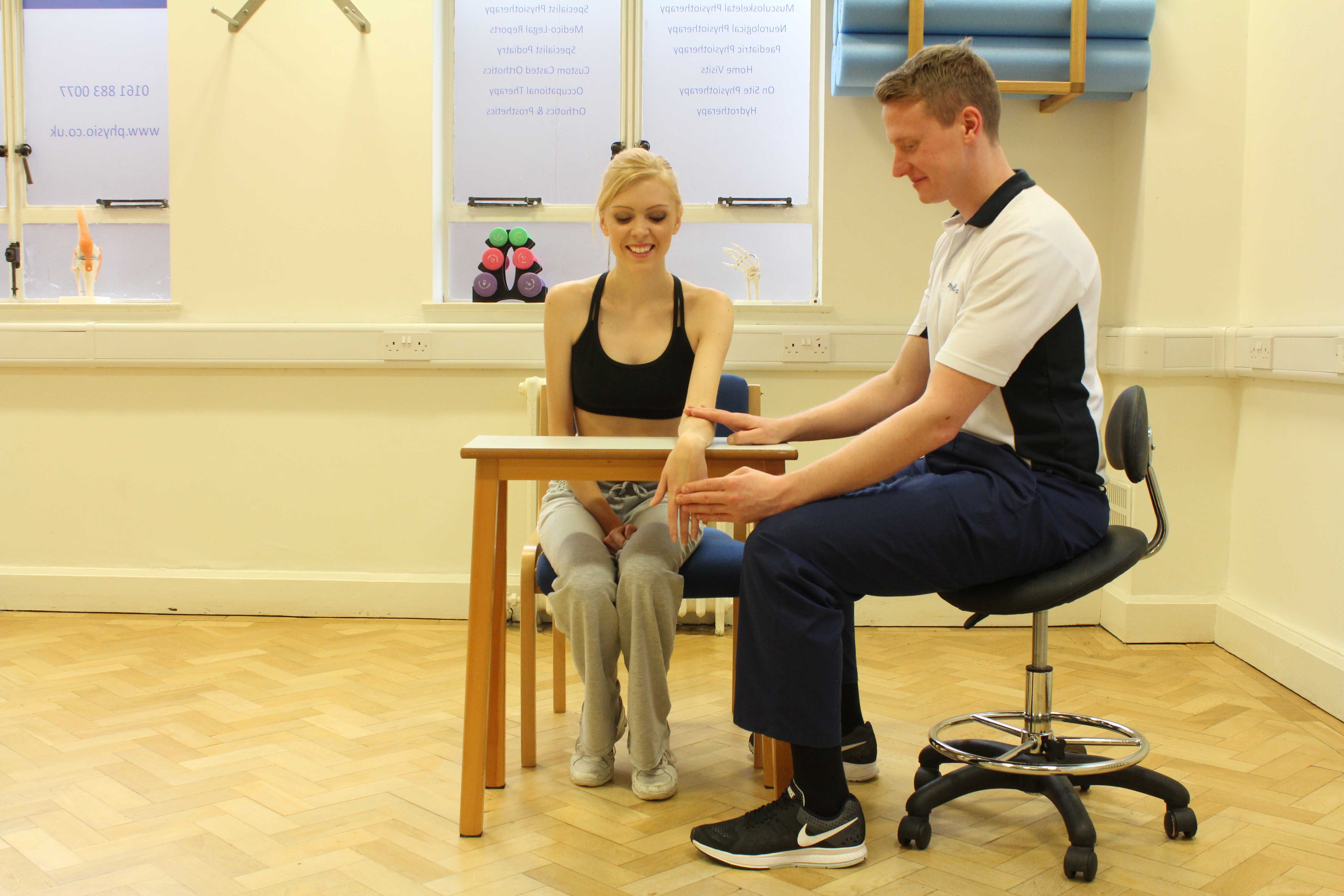What is carpal tunnel syndrome?
Carpal tunnel syndrome is caused by the compression of a nerve as it passes through the wrist joint. It causes pain, sensory changes and a loss of hand function. Physiotherapy is a successful treatment for carpal tunnel syndrome.
How does carpal tunnel syndrome happen?
Carpal tunnel syndrome is caused by compression of the median nerve as it passes through the carpal tunnel. The carpal tunnel is made up on three sides by the wrist bones and the roof of the tunnel a strong, broad ligament. Passing through this tunnel is the median nerve which sends signals from the brain to the hand. The walls of the tunnel are inflexible, therefore, if any of the tendons that run through become swollen, the median nerve can become compressed. This compression interferes with the messages or signals transmitted by the nerve.
 Above: Soft tissue massage and mobilisation of the carpal bones and the surrounding connective tissues
Above: Soft tissue massage and mobilisation of the carpal bones and the surrounding connective tissuesWhat are the symptoms of carpal tunnel syndrome?
Carpal tunnel syndrome can produce a number of symptoms, all as a result of the compression of the median nerve. The most common is pain in the wrist and hand, and numbness and tingling in the fingers (not including the little finger). These can be present when the wrist is moved or at rest and often occurs at night time. Carpal tunnel syndrome can also cause a feeling of weakness in the hand. This may cause a clumsy hand, the dropping of objects and poor performance in any sport which requires a strong grip. Other symptoms may include:
What should I do if I have carpal tunnel syndrome?
If you have or suspect you have carpal tunnel syndrome, you should consult a physiotherapist for an assessment. In the meantime you should avoid activities which cause your symptoms to worsen.
Physiotherapy treatment for carpal tunnel syndrome.
Physiotherapy is important in the treatment of carpal tunnel syndrome. Your physiotherapist can confirm your diagnosis and establish its severity. To establish a diagnosis a special nerve conduction test may be required to assess the transmission of signals along the affected nerve. From the assessment, your physiotherapist will devise an appropriate treatment plan. Treatment often involves involve activity modification, the taking of anti-inflammatory medications, electrotherapy and splinting of the wrist and hand.
Other treatment options include: In severe or long-standing cases, surgery may be required. Following surgery, active physiotherapy is required to restore full function to your hand by strengthening your hand, returning the range of movement in your wrist and hand to normal, and desensitising your scar.
 Above: Our physiotherpaist assesing his patient for signs positive signs of carpal tunnel.
Above: Our physiotherpaist assesing his patient for signs positive signs of carpal tunnel.What shouldn’t I do if I have carpal tunnel syndrome?
If you have carpal tunnel syndrome, you should not ignore the problem as it could get worse and prolong your recovery.
Could there be any long-term effects from carpal tunnel syndrome?
In many cases of carpal tunnel syndrome there are no long-term effects, if it is properly diagnosed and appropriately treated. In serious cases, surgery may be required to release the compression of the nerve.
To arrange a physiotherapy assessment call Physio.co.uk on 0330 088 7800 or book online.

 0330 088 7800
0330 088 7800

































